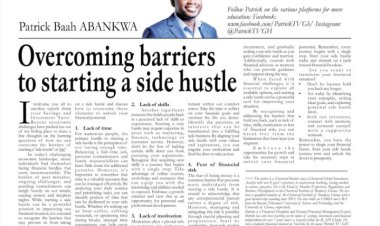GRADUATE SURVIVAL AFTER SCHOOL

Welcome to another week of financial learning.
I had the privilege of engaging business students at Central University last year at Miosto, Prampram on how they could survive financially after school.
I would therefore like to reshare some few tips on how we can prepare ourselves for the job market after school.
Many students always have this desire of a dream job after school.
Some dream of that bank work, accounting firm, well furnished hospital, highly recognized International School to mention a few.
Others also work on their business proposals while in school for that big breakthrough.
Whichever path a student choses come with some level of tough decisions and sacrifice.
Year on year, we have tons of graduates coming out of our tertiary institutions.
The Private and Public Universities, Technical Universities and training colleges churn out thousands of graduate yearly onto the working market.
The growing number of unemployed graduates in the country keeps on increasing day by day.
Security experts have labelled the growth of unemployed graduates as a security threat which needs to be addressed.
Out of frustration, many graduates first point of call after school is to apply for further studies outside the country because there is no hope for them on the job market.
The above dark picture unfortunately is not perculiar to just Ghana and Africa.
It has become a global problem!
A report by Forbes in 2013 showed that Greece has the highest percentage of graduate unemployment standing at 19.4%, followed by Spain at 14.9%, Turkey at 7.7% to mention few.
The unemployment rate in Ghana as estimated by Trading Economics is around 6.8% as at 2019.
Inspite of these damning statistics, students and graduate need to understand that the world is a global village now with technology driving success.
Graduates come into a world full of other job-seeking people.
Without any verifiable data gathered, I can confidently say that the least number of applicants one will possibly receive with an advertisement can range from 1,000 to 5,000.
Tertiary education especially University education has therefore gone beyond guaranteed job opportunity after school.
Students will have to start conditioning their minds whiles in school to either enrich their knowledge base beyond the classroom or come up with an exciting business proposal that can easily be funded after school.
University education has moved from just classroom teaching and learning to an avenue of social connectivity.
Business partners and potential employers are all found on campus.
Studying hard is very important and crucial to the final grade of the student. However, ones ability to knit ties and expand his or her social network is equally important on campus.
In effect, the average university student has only two options to focus on after school.
- Be Employed
- Self Employed
If one decides to be employed, there are some basic things that you will need to know and perfect to be ripped for the job market.
COMMUNICATION AND PRESENTATION SKILLS FOR INTERVIEWS
Communication is a part of our daily lives. We express our thought and ideas through communication.
According to Interview Success Formula Inc, it is one of the most basic skills needed in life, and the most important during an interview. You can have the perfect resume and credentials, but if you are unable to communicate properly during your interview, you still won’t be hired.
Research by NACE (National Association of Colleges and Employers) called Job Outlook 2011, in which employers were asked to rate the importance of certain skills/qualities when hiring job candidates, showed verbal communication as the most important one, followed by a strong work ethic, teamwork skills, analytical skills, and initiative.
Student therefore need to boost their communication skills whiles on campus with seminars, role playing, communication lessons etc
ACQUIRING THE NECESSARY CERTIFICATES BESIDE YOUR DEGREE
It is okay to study banking, accounting, sociology, nursing, mathematics, physics, English to mention few.
You are however going to compete with others who have that first degree in accounting in addition to Level 2 of ICA or ACCA.
Professional courses in banking, marketing, accounting, management, insurance etc are very necessary. They add an additional weight to the first degree holder.
Other short courses and certificates are also very important.
These courses should be taken whiles on campus or on vacation.
This places you above your peers whiles having an excellent communication skill.
BASIC INDUSTRY UNDERSTANDING
Having basic information about the industry you want to work in after school is an Achilles heel to most students.
It will surprise you to meet a banking and finance graduate who does not know the difference between Universal banks and the other classes of financial institutions.
This embarrassment should never be your portion.
Whiles on campus, take particular interest in whatever goes in and around the industry, you aspire to work in after school.
Employers perceive this industry information to be basic and hence, easily disqualify candidates who show gross ignorance!
PERSONAL GROOMING AND ETHICS
When you meet someone for the first time, they will make their minds up about you based upon your appearance, body language, smile, eye contact, stance and posture and how you sound.
Personal grooming has become essential in our daily life.
In today’s competitive and modern business world, it is highly essential to adhere with professional appearance and grooming for the workplace and interviews.
A well-groomed individual stands out amongst the crowd.
Graduates need to acquire the basic skills to care for their skin and learn makeup tips to enhance their personal appearance.
Wear business suits in basic colors.
Always be neat and clean including your teeth, fingernails, face, hair and even your shoes.
Keep your pockets empty and as much as possible avoid tinkling coins or keys and bulges.
These are some basic grooming tips, which will be needed during the interview session and your working life.
DIVERSIFICATION OF IDEAS
In the introduction, I stressed on the point that we live in a global competitive world. In a competitive world, you may not always be employed based on your field of study.
I always use myself as an example when I talk about diversification of ideas.
I studied Sociology at the University of Ghana.
I took up a professional banking course with the Chartered Institute of Bankers, Ghana at level 300.
By the time I graduated from the University of Ghana, I had a Bachelor of Arts degree in Sociology and Level 3 completed for the banking professional.
I had at this stage a deep knowledge about banking and human behavior.
This did not mean I had to settle on a banking job at all cost. I applied to varied type of industries because I believe I had more to offer than working in a financial I institution.
That is how diversification works.
There fact that you are studying, as an accountant does not mean your focus should just be with an audit or accounting firm.
You need to widen your scope of knowledge to other fields of study via articles, blogs, and short courses to mention few.
Beyond the points listed above, there are a lot that graduates can do to position themselves in the competitive job market.
I will tackle the second option of graduate survival in my next financial epistle.
I wish everyone a wonderful and memorable week!
Gratis

 baasco2006
baasco2006 













